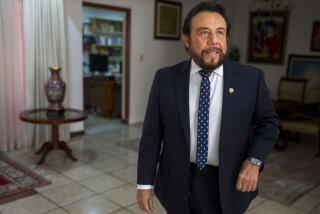The Fighting Is a Form of Negotiation
- Share via
A new round of rebel attacks in El Salvador have President Alfredo Cristiani threatening to cut off peace talks with the guerrillas fighting to overthrow his government. While his frustration is understandable, it would be a mistake to stop negotiating. That will only exacerbate the bloodshed.
The renewed fighting that broke out last week really should not have surprised anyone. Army intelligence officers in San Salvador had been predicting it, and spokesmen for the rebel Farabundo Marti National Liberation Front had been threatening it. The FMLN insists that the only way it can get concessions from the government in the painfully slow, U.N.-sponsored peace talks is to remind Cristiani of the kind of damage its fighters can still inflict, even after more than 12 years of fighting.
Indeed, even amid contradictory claims of battlefield casualties, it’s clear that the rebels proved their point. Fighting was reported in half of El Salvador’s 14 provinces, at least 90 persons were reported killed, perhaps half of them soldiers, and rebel sabotage of the electrical system blacked out large sections of the country. Frighteningly, many military analysts in El Salvador warned that the attacks may have been little more than a strategic feint by the rebels--that the majority of their fighters may have been held in reserve for later.
That fits the pattern of this long civil war--neither side can defeat the other, but they can bloody each other badly. In a nation exhausted by war, that leaves negotiation as the only realistic option.
More to Read
Sign up for Essential California
The most important California stories and recommendations in your inbox every morning.
You may occasionally receive promotional content from the Los Angeles Times.













